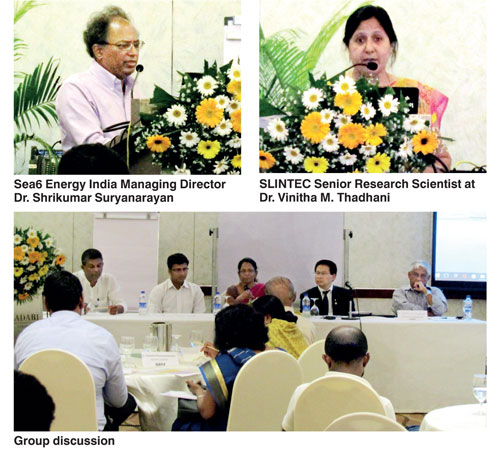Wednesday Feb 18, 2026
Wednesday Feb 18, 2026
Tuesday, 23 May 2017 00:00 - - {{hitsCtrl.values.hits}}
A workshop was organised on 2 May on ‘Mapping out value chain for development of a seaweed industry in Sri Lanka’ at the Galadari by the Sri Lanka Institute of Nanotechnology, in affiliation with Flinders University, Adelaide, Australia.
The aim of this workshop was to find out the feasibility of setting up a sea weed industry in Sri Lanka by bringing in all parties concerned, into one forum to see their joint interest in setting up industry from this long neglected renewable natural resource. The 1700 km long coastal belt of unpolluted sea coupled with rich biodiversity of over 572 species of seaweed offers a great potential for a seaweed industry in Sri Lanka.
Various private sectors which use seaweed compounds for their manufacturing process, such as, Unilever, cosmetic industries, textile/dyeing industries, fertiliser companies, Ministry officials and NSF officials along with researchers from NARA and universities participated for the workshop.
Workshop coordinator Dr. Vinitha M. Thadhani, as Senior Research Scientist at SLINTEC, highlighted that the EEZ ocean area of Sri Lanka (517,000 Km2) was over eight times of that of land area of Sri Lanka (62,705 Km2), however the agricultural income – aqua cultural and fisheries income – was not proportionate. The importance of bio-refinery process for effective utilisation of this renewable natural resource was emphasised.
Prof. Wei Zhang, Head, Centre for Marine Bio-Products Development, Flinders University, Australia, discussed the potential of seaweed as “functional food ingredients with gut health benefits” while Dr. Shrikumar Suryanarayan, Managing Director, Sea6 Energy Ltd., Bangalore, India, discussed the development of new technologies for cultivation and utilisation of seaweed biomass specifically in agriculture.
Prof. Ajith Alwis, Project Coordinator COSTI, discussed the possibilities of ‘Scaling Up and Measure of Success,’ which was followed by an open discussion on ‘Previous attempts of commercial exploitation, reasons for non-viability, and the possible ways to increase viability’. Prof. Sirimali Fernando, Chairman NSF, Ananda Hettiarachchi, Nitin Sanghe, and Industrial Development Board officials participated in the discussion.
Pix by Lasantha Kumara